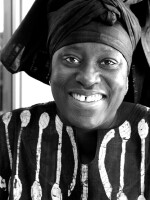The sudden passing of our beloved Miriam has saddened us and our nation. ... Despite her tremendous sacrifice and the pain she felt to leave behind her beloved family and her country when she went into exile, she continued to make us proud, as she used her worldwide fame to focus attention on the abomination of apartheid. ... Her music inspired a powerful sense of hope in all of us.
Grammy award-winning South African singer Miriam Makeba has died. The great-grandmother — known affectionately as "Mama Africa" — reportedly suffered a heart attack after performing at an anti-mafia concert Sunday in southern Italy. She was 76.
Miriam Zenzile Makeba embodied the pan-Africanist spirit of the 1960s when she burst onto the international stage and unwittingly became the voice and symbol of the anti-apartheid struggle in South Africa.
On tour in the U.S., Makeba had her passport revoked and was banned from returning home after she was featured in a documentary that criticized apartheid. Makeba was just 27 at the time and wouldn't see South Africa again for more than 30 years, she told NPR in an interview in 2006.
"It was very painful for me not to go back home," she said. "Mostly it was painful that I couldn't come home to bury my mother. But, you know, in life you make choices. You say, OK, are you going to sit here, Miriam Makeba, and say 'I'm a star' and forget about home? Or do you decide to say 'I'm a South African and this is what is happening to our people' and so on? And I made that decision. And from then on, I was branded that artist who sings politics."
She was helped by established artists like her mentor, Harry Belafonte, with whom she won a Grammy for their joint album, An Evening with Belafonte and Makeba.
Makeba made a new home in the U.S. and settled into telling and singing the story of South Africa, reaching an American audience with her unique brand of music, laced with a social message about the suffering of black people back home. Makeba was an instant sensation.
She sang in every language under the sun, including her own — Xhosa — unknown to Americans at that time. But Makeba fiercely resisted being pigeonholed as a musician, describing herself simply as a chanteuse, a singer.
"And now I'm saying what am I? Jazz? Folk? What am I? When I sit back and think over the life of my career, the first jazz festival I performed in was at the Monterey Jazz Festival in the early '60s. I said, 'Why am I going there?' And I opened the festival, and they had me sing a cappella.
"And then they had Odetta. Odetta came after me and did the work songs, which were done by the slaves that were taken from Africa. ... And then Nina Simone came and did the jazz. ... So I was like the first to give the knowledge that jazz came from Africa, that the music evolved into jazz, which then Nina Simone epitomized in that jazz festival.
"That is why I always say, please, don't put me, Miriam Makeba, in a cage. I do not want to be labeled. When people ask me, what do you sing? I say, I just sing. I sing music."
Makeba abruptly left the U.S. after her then-husband, the radical civil rights campaigner Stokely Carmichael — later known as Kwame Ture — fell afoul of the authorities and opted for exile in Guinea in West Africa.
A committed pan-Africanist who thought continental and sang continental, Makeba once said she longed for South Africa but felt welcome and at home anywhere on the continent. She accompanied Paul Simon on the legendary Graceland tour in 1987 and finally returned home to Johannesburg in the 1990s, after Nelson Mandela was released from prison.
In his letter of tribute, Mandela said: "The sudden passing of our beloved Miriam has saddened us and our nation. For many decades, starting in the years before we went to prison, MaMiriam featured prominently in our lives, and we enjoyed her moving performances at home. Despite her tremendous sacrifice and the pain she felt to leave behind her beloved family and her country when she went into exile, she continued to make us proud, as she used her worldwide fame to focus attention on the abomination of apartheid. ... Her music inspired a powerful sense of hope in all of us."
Well into her 70s and by then a great-grandmother, Makeba continued to perform onstage and record new albums. She was a proud United Nations goodwill ambassador and also set up a school for destitute young girls in South Africa.
Copyright 2022 NPR. To see more, visit https://www.npr.org. 9(MDAzMjM2NDYzMDEyMzc1Njk5NjAxNzY3OQ001))






